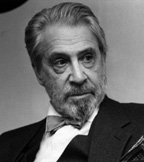The HyperTexts
Anthony Hecht

Anthony Evan Hecht (January 16, 1923 – October 20, 2004) was born in New York City to German-Jewish parents.
He was the brother of Roger Hecht, another gifted poet published by The HyperTexts.
As an academically undistinguished freshman at Bard College, Hecht discovered
Wallace Stevens, W. H. Auden, T. S. Eliot and Dylan Thomas, then decided to become a poet
himself. Hecht's understandably concerned parents persuaded a family friend, Ted
Geisel (more famously known as Dr. Seuss) to dissuade him: fortunately, without
success. However, Hecht's path to poethood was not to be lined with roses.
In 1944-45 he saw heavy combat as an infantryman in Europe, barely escaping a
rescinded order that would have resulted, as he put it, in "nothing but total
annihilation" Later, his division helped liberate the Flossenbürg concentration camp
and, because he had "the rudiments of French and German," he was ordered to interview
the French prisoners still "well enough to speak." Recalling the experience he said, "The place, the
suffering, the prisoners' accounts were beyond comprehension. For years after I
would wake shrieking." The horrors of war and the Holocaust would become recurrent themes in his work.
(And yet, showing his versatility and range, Hecht is one of the inventors,
along with Paul Pascal, of the double dactyl: one of the sillier forms of light
verse, which often begins "higgledy piggledy . . .").
After the war, Hecht studied under John Crowe Ransom at Kenyon College, where he rubbed shoulders
with poets like Robert Lowell, Randall Jarrell, Elizabeth Bishop and Allen Tate.
He later received his master's degree from Columbia University, then went on to
teach poetry at the University of Rochester, Smith, Bard, Harvard, Georgetown and Yale.
Hecht released his first collection of poems, A Summoning of Stones, in
1954. He won a number of literary awards including: the Prix de Rome, the Pulitzer Prize for Poetry (for The Hard Hours), the
Bollingen Prize, the Ruth Lilly Poetry Prize, the Wallace Stevens Award, the Frost Medal and the Tanning Prize.
He is buried at the cemetery at Bard College.
More Light! More Light!
for Heinrich Blucher and Hannah Arendt
Composed in the Tower before his execution
These moving verses, and being brought at that time
Painfully to the stake, submitted, declaring thus:
"I implore my God to witness that I have made no crime."
Nor was he forsaken of courage, but the death was
horrible,
The sack of gunpowder failing to ignite.
His legs were blistered sticks on which the black sap
Bubbled and burst as he howled for the Kindly Light.
And that was but one, and by no means one of the worst;
Permitted at least his pitiful dignity;
And such as were by made prayers in the name of Christ,
That shall judge all men, for his soul's tranquility.
We move now to outside a German wood.
Three men are there commanded to dig a hole
In which the two Jews are ordered to lie down
And be buried alive by the third, who is a Pole.
Not light from the shrine at Weimar beyond the hill
Nor light from heaven appeared. But he did refuse.
A Luger settled back deeply in its glove.
He was ordered to change places with the Jews.
Much casual death had drained away their souls.
The thick dirt mounted toward the quivering chin.
When only the head was exposed the order came
To dig him out again and to get back in.
No light, no light in the blue Polish eye.
When he finished a riding boot packed down the earth.
The Luger hovered lightly in its glove.
He was shot in the belly and in three hours bled to
death.
No prayers or incense rose up in those hours
Which grew to be years, and every day came mute
Ghosts from the ovens, sifting through crisp air,
And settled upon his eyes in a black soot.
Sarabande On Attaining The Age Of Seventy-Seven
The harbingers are come. See, see their mark;
White is their colour; and behold my head.
—George Herbert
Long gone the smoke-and-pepper childhood smell
Of the smoldering immolation of the year,
Leaf-strewn in scattered grandeur where it fell,
Golden and poxed with frost, tarnished and sere.
And I myself have whitened in the weathers
Of heaped-up Januaries as they bequeath
The annual rings and wrongs that wring my withers,
Sober my thoughts, and undermine my teeth.
The dramatis personae of our lives
Dwindle and wizen; familiar boyhood shames,
The tribulations one somehow survives,
Rise smokily from propitiatory flames
Of our forgetfulness until we find
It becomes strangely easy to forgive
Even ourselves with this clouding of the mind,
This cinerous blur and smudge in which we live.
A turn, a glide, a quarter turn and bow,
The stately dance advances; these are airs
Bone-deep and numbing as I should know by now,
Diminishing the cast, like musical chairs.
The HyperTexts
